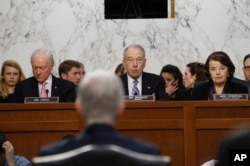A Senate panel approved Supreme Court nominee Neil Gorsuch Monday, sending President Trump’s pick to the full Senate where a ferocious battle looms that could forever alter how the chamber fulfills its constitutionally-mandated role of advice and consent.
The Senate Judiciary Committee voted 11-9, with all Republicans backing Gorsuch and all Democrats opposing the conservative federal appellate judge.
“Judge Gorsuch is eminently qualified,” said the committee's chairman, Senator Chuck Grassley, an Iowa Republican. “He’s a mainstream judge who’s earned the universal respect of his colleagues on the bench and in the bar [legal community]. He applies the law as we in Congress write it … He’s a picture of the kind of justice we should have on the Supreme Court.”
Questions, concerns remain
Democrats said Gorsuch’s testimony at last month’s confirmation hearing only deepened their questions and concerns about his judicial philosophy.
“I cannot support this nomination,” said the committee’s top Democrat, Senator Dianne Feinstein of California. “Judge Gorsuch’s views were difficult to discern because he refused to answer many questions, even basic questions that have been answered by previous nominees.”
That point was echoed by Democratic Senator Patrick Leahy of Vermont, who noted that Gorsuch was reluctant to share his views on some of America’s most-celebrated legal decisions, like the 1954 Supreme Court decision ending racial segregation in American schools.
“Is there anybody on this committee or elsewhere who would disagree with Brown v. Board of Education?” Leahy asked. “He [Gorsuch] refused to say whether the equal protection clause [of the Constitution] applies to women. He refused to say whether the framers of the First Amendment believed it permitted the use of a religious litmus test.
“Unless we were talking about fishing or basketball, Judge Gorsuch stonewalled and avoided any substantive response,” Leahy added.
Voting with a ‘clear conscience’
Republicans came to Gorsuch’s defense.
“I will vote for him with a very clear conscience,” said South Carolina Republican Senator Lindsey Graham. “To say that this man somehow wishes Brown v. Board of Education wasn’t decided … is a bit of a stretch.”
“Seeking assurances from the nominee on how he’ll vote on particular legal questions undermines the very independence that we demand of the Supreme Court,” Grassley said.
Again and again, Republicans hailed Gorsuch’s legal credentials and judicial temperament.
“He will be impartial, fair, and open-minded. He will be exactly the kind of justice America needs and that our liberty requires,” said Senator Orrin Hatch of Utah.
‘Not just evaluating a resume’
“There’s no question he’s well-educated and well-credentialed,” Feinstein conceded. “But we’re not just evaluating a resume. If we were, every Supreme Court nominee would pass unanimously, 100 to zero.”
Democrats continued to vent over last year’s refusal by the Senate’s Republican majority to consider former president Barack Obama’s Supreme Court nominee, Judge Merrick Garland.
“Senate Republicans held a Supreme Court vacancy and an eminently qualified nominee hostage with the sole and express intent to deny President Obama an appointment to the Supreme Court, an appointment that he had every right, by precedent, by law to make,” Leahy said.
Graham shot back that Democrats would have done the same to block a Republican high court nominee if the situation were reversed, and that Democrats themselves changed Senate rules when they controlled the chamber to make it easier to confirm all of Obama’s nominees other than Supreme Court picks.
“When you [Democrats] complain about Garland, it’s the arsonist complaining about the fire,” Graham said.
Filibuster
Another rules change could occur if Democrats attempt to block Gorsuch in the full Senate through a filibuster, which necessitates a three-fifths majority to get to a final vote. At least 41 Democrats are on record opposing Gorsuch, the number needed for a filibuster to succeed in the 100-member chamber.
Republicans say they will defeat a filibuster by any means necessary, including changing the rules governing the Senate.
“We will not have a successful filibuster of a Supreme Court nominee, because if we have to we will change the rules, and it looks like we are going to have to,” Graham said.
A rules change has been called "the nuclear option," as it would alter the very nature of the Senate, a body that historically has afforded the minority party the ability to thwart or delay the will of the majority.
If confirmed, Gorsuch would take the Supreme Court seat once held by Justice Antonin Scalia, a conservative nominated by former president Ronald Reagan in 1986. Scalia died in February of last year.







